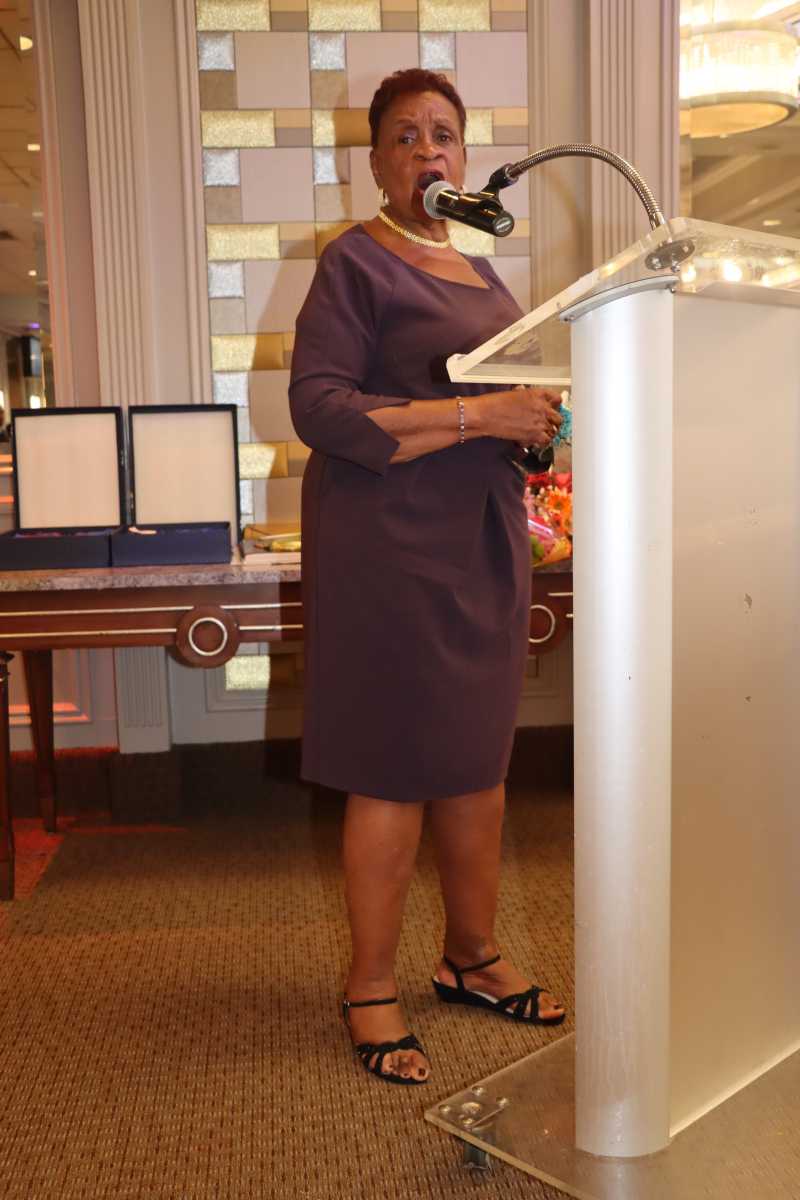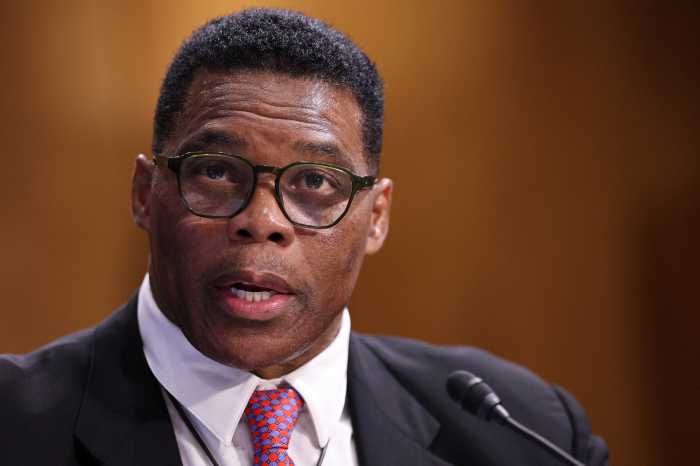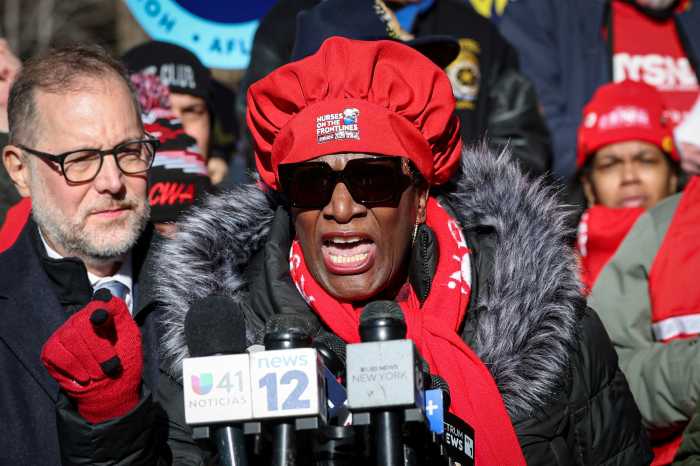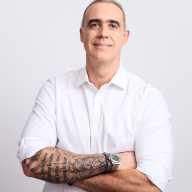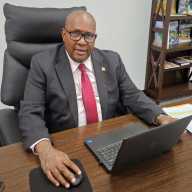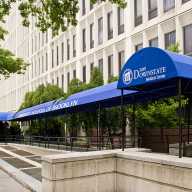Registered Nurse Dr. Catherine Alicia Georges, a St. Thomas, US Virgin Islands-born professor and chairperson emerita of the Department of Nursing at Lehman College and professor at Meharry Medical College, says that the “power of nursing must be apparent” in these times.
“We have challenges we must deal with, and the power of nurses must be apparent,” said Dr. Georges, a Bronx resident and a leader in academic nursing, health policy development, community engagement, organizational development, and healthy aging, in delivering the keynote address at the New York-based Caribbean-American Nurses Association (CANA) Annual Scholarships and Leadership Awards Gala at Russo’s on the Bay, on Cross Bay Boulevard, in the Howard Beach section of Queens, on Sunday, Aug. 3.
“But I say to you, do not be daunted because we are faced with challenging times,” added Dr. Georges, who served as the fifth president of the National Black Nurses Association and is the president of the National Black Nurses Foundation, speaking on “The Power of Nurses: This is the Time to Use It.”
“The nurses touch people’s lives in a profoundly positive way,” continued Dr. Georges, a lifetime member of the National Black Nurses Association and Alpha Kappa Alpha Sorority, who served as chair of the National Board of Easter Seals 2021-2023. “Nurses are a critical part of a health care field, which is undergoing considerable change because of the multiple issues in our society, such as the current political, economic and environmental.
“I can’t tell you exactly how all this will shake out in the next year or two, but we must be active participants in determining what we want to happen in this country for all living here,” urged Dr. Georges, who also served as a member of the RAISE National Family Caregiving Advisory Council of the US Department of Health and Human Services, is a fellow of the NY Academy of Medicine and the American Academy of Nursing, and is a Fulbright Specialist of the US Department of State`s Bureau of Educational and Cultural Affairs.
But Dr. Georges, who, in 2019, was named a Living Legend by the American Academy of Nursing, said there are some fundamental truths “we can be confident about that will shape your future work and the future of health care.”
She said one is demographic, another is the influence of social determinants of health, a third “fundamental truth” is the critical role of nurses – “a role that I deeply believe has and will become increasingly important.”
Dr. Georges – who has mentored generations of nurses and health professionals, has played a pivotal role in advancing nursing practice and public health both nationally and globally, and served as the national volunteer president of AARP (American Association of Retired Persons) from 2018-2020, the world’s largest consumer organization –noted that 10,000 people in America turn 65 every day, and that, by 2030, one in five Americans will be 65 or older.
“By that time, we might have a million people age 100 or older,” she said. “Our fastest growing age group is comprised of those over 85. People want to age with dignity and purpose—and the overwhelming majority of them want to age at home.
“As we reflect on longer lifespans, we need to focus intensely on longer health spans—later years in which we are in relatively good health, able to keep working if we want to and able to enjoy the gift of time,” Dr. Georges added. “We must continue to recognize and address glaring health disparities—disparities driven by longstanding social determinants that exist across ethnic, racial, socioeconomic and geographical lines, often in defiance of more promising trends in the population as a whole.”
She said social determinants of health, which include areas such as homelessness, poverty food insecurity education and social isolation, have “once again intersected and will intensify if what this administration will put into action with the cuts in Medicaid, SNAP, student loans, grants to increase workforce diversity”
Dr. Georges said “very meaningful” progress in health care through the passage of the Affordable Care Act, instituted by President Barack Obama, has been made.
But she asked rhetorically: “How much of that will be rolled back?
“We must use our power of advocacy to assure that social determinants of health are a central part of the debate and decisions about improving health care,” she said.
“What does Mr. Kennedy need to hear from us as he purports making America healthy again?” she asked, referring to Robert F. Kennedy, Jr., the 26th Secretary of the US Department of Health and Human Services
As skilled listeners and trusted professionals, Dr. Georges said nurses are “adept at addressing critical questions concerning these social determinants.
“Nursing must have a vital role in making sure we acknowledge and address social determinants,” she said. “Nursing is critical to meeting the health care challenges of an aging population and to inform and support America’s now estimated over 60 million family caregivers, and provide care coordination, chronic disease management and preventive care, such as preventing maternal deaths, particularly Black maternal health and morbidity.
Dr. Georges lamented that, in many parts of the country, one’s zip code becomes the manner in which one is treated—”health disparity by location and in many instances race and ethnicity.
“Making automatic assumptions about patients is antithetical to good health care,” she said. “Understanding all the implications of the new code of ethics is paramount for our practice. Think of the many other assets nurses bring to a leadership role.”
She said power is through technical knowledge and holistic approaches to care of patients and communities.
She noted that, for more than 20 years, the Gallup Organization has found nursing to be the most trusted profession.
Dr. Georges urged nurses not to hesitate to look for opportunities for leadership, to find a place at the table where policies are set.
“No seats, bring your own chair,” she said. “Get onto boards that affect policies; run for office; if not, support those that share nursing vision.
“I urge you to use your voice,” she added. “Our communities and our country need to hear the voices of nurse leaders not only in the hospital room, but in the board room, the committee room, the legislative chamber—places where budget and policy decisions are made.
“We need to hear the voice of nurses on the social determinants of health,” continued Dr. Georges, quoting Eleanor Roosevelt, who once said: “Do what you think you cannot do.”
Eleanor Roosevelt was the longest-serving first lady of the United States, during her husband Franklin D. Roosevelt’s four terms as president from 1933 to 1945.
Dr. Georges said “’Do what you think you cannot do’ must become part of the nursing profession.
“Being resilient and having a sense of humor about life and about yourself are indispensable,” she added “The power of nurses is in using our knowledge and using your voice. Patients, communities and this country need us to demonstrate our power of endurance.
“When more and more nurses speak up, we’ll set in motion an unstoppable wave of change,” Dr. Georges continued. “Your influence in private settings and in public policy will reinforce each other.
“I want to urge you to set your direction by a moral compass, understanding the principles and the value of teamwork,” she said, stating that globally, there are about 29 million nurses and little more than 2.2 million midwives.
In parts of the world, she said nurses are the primary care providers, are women and are women of color.
In the US, Dr. Georges said there are about 4.5 million nurses with active licenses.
In acknowledging the power of some nurses, who were born in the Caribbean, Dr. Georges referred to Mabel Keaton Staupers, a nurse who was born in Barbados and who attended the Freedman Hospital School of Nursing, now Howard University.
Dr. Georges said Keaton Staupers was a pioneer in caring for TB patients, fought for acceptance of Blacks in the Armed Forces Nursing Corps, and met with Eleanor Roosvelt to advocate for and got it.
Dr. Georges also alluded to Syringa Marshall Burnett, the first executive director of the National Association of Colored Graduate Nurses, later its president.
Marshall Burnett’s book is No Time for Prejudice.
Dr. Georges said Marshall Burnett was president of the Jamaican Senate, and advocated with another nurse power broker, Dr. Mary Jane Seivewright, to establish a nurse practitioner and BS program at the University of the West Indies, Mona Campus in Jamaica.
In addition, Dr. Georges said Dame Nita Barrow was a Barbadian nurse and first female Governor General of Barbados, who was educated at New York University (NYU).
In June 2020, Dr. Georges received the Distinguished Alumna Award from Seton Hall University in New Jersey.
In October 2021, she received the Academy of Nursing Lifetime Legacy Achievement Award.
Dr. Georges earned a BSN from Seton Hall University College of Nursing, an MA in nursing from NYU (Rory Meyers College of Nursing) and an Ed. D in educational leadership and policy studies from the University of Vermont.
She is also the recipient of three honorary doctorates: College of New Rochelle, A.T. Still University and Chestnut Hill College.


